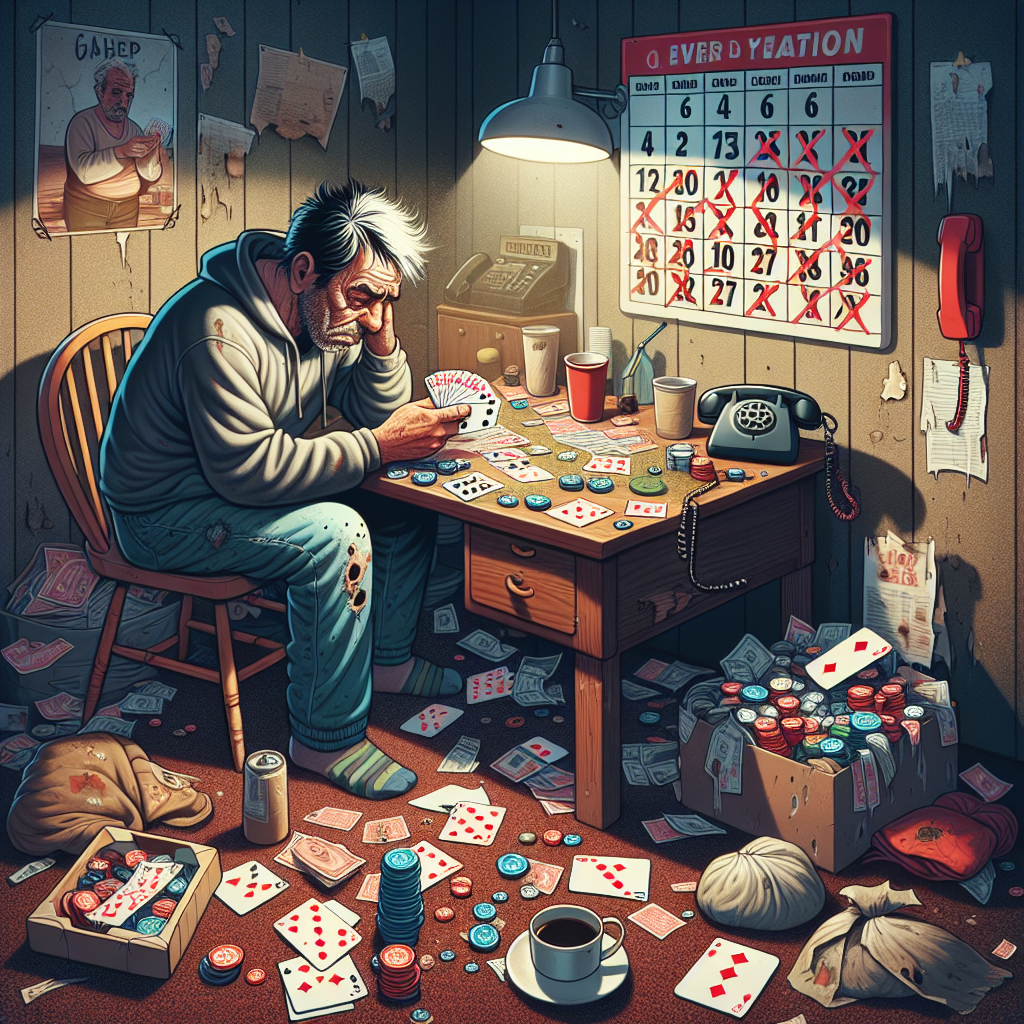-
Table of Contents

“Recognize the Signs: When Gambling Takes Control, It’s Time for Recovery.”
Introduction
Gambling addiction, also known as compulsive gambling or gambling disorder, is a serious condition that can have devastating effects on an individual’s life. Recognizing the signs that someone needs gambling addiction recovery is crucial for timely intervention and support. Key indicators include an increasing preoccupation with gambling, such as constantly thinking about past gambling experiences or planning the next venture. Financial problems often arise, with the individual frequently borrowing money, selling possessions, or even resorting to illegal activities to fund their habit. Emotional and psychological signs include feelings of guilt, anxiety, or depression related to gambling, as well as irritability or restlessness when attempting to cut down or stop gambling. Social and occupational issues may also become evident, with the person neglecting responsibilities at work, school, or home, and experiencing strained relationships with family and friends. Physical symptoms, such as sleep disturbances and stress-related health issues, can also manifest. Recognizing these signs early can lead to effective treatment and recovery, helping the individual regain control over their life.
Recognizing Behavioral Changes: Key Indicators of Gambling Addiction
Recognizing behavioral changes is crucial in identifying when someone may need gambling addiction recovery. Gambling addiction, often referred to as compulsive gambling or gambling disorder, can have devastating effects on an individual’s life, relationships, and financial stability. Understanding the key indicators of this addiction can be the first step toward helping someone regain control and seek the necessary support.
One of the most telling signs of gambling addiction is an increasing preoccupation with gambling activities. This may manifest as the individual constantly thinking about past gambling experiences, planning the next venture, or devising ways to obtain money for gambling. This obsession can overshadow other important aspects of life, such as work, family, and social obligations, leading to a noticeable decline in overall functioning.
Another significant indicator is the need to gamble with increasing amounts of money to achieve the desired excitement. This tolerance build-up is similar to what is observed in substance addictions, where the individual requires more of the substance to experience the same effect. In the context of gambling, this can lead to riskier bets and larger financial losses, further entrenching the individual in a cycle of addiction.
Additionally, individuals struggling with gambling addiction often experience restlessness or irritability when attempting to cut down or stop gambling. This withdrawal-like symptom can make it incredibly challenging for them to break free from the addiction without professional help. The emotional turmoil associated with these feelings can also lead to other mental health issues, such as anxiety and depression, exacerbating the situation.
Lying to conceal the extent of gambling involvement is another red flag. Those with a gambling problem may go to great lengths to hide their activities from family and friends, fearing judgment or intervention. This deceit can strain relationships and erode trust, creating a sense of isolation and further driving the individual toward gambling as a coping mechanism.
Financial difficulties are often a glaring sign of gambling addiction. The individual may frequently borrow money, sell personal belongings, or even resort to illegal activities to fund their gambling habit. The mounting debts and financial instability can lead to significant stress and desperation, making it even harder for the person to seek help.
Moreover, neglecting responsibilities and personal care is a common behavioral change in those with a gambling addiction. They may miss work, neglect household duties, or fail to maintain personal hygiene due to the overwhelming focus on gambling. This neglect can have far-reaching consequences, affecting not only the individual but also those around them.
Despite these challenges, it is important to approach the situation with empathy and understanding. Encouraging open communication and offering support can make a significant difference. If you recognize these signs in someone you care about, gently expressing your concerns and suggesting professional help can be a pivotal step toward recovery.
In conclusion, recognizing the behavioral changes associated with gambling addiction is essential for timely intervention and support. By being aware of the key indicators, such as preoccupation with gambling, increased tolerance, withdrawal symptoms, deceit, financial troubles, and neglect of responsibilities, we can better identify when someone may need help. With compassion and encouragement, we can inspire those struggling with gambling addiction to seek the recovery they need and deserve, ultimately leading to a healthier and more fulfilling life.
Financial Red Flags: How to Identify a Gambling Problem
Recognizing the signs that someone needs gambling addiction recovery can be challenging, especially when the individual is adept at concealing their behavior. However, financial red flags often serve as the most telling indicators of a gambling problem. By understanding these signs, you can take the first step toward helping someone regain control of their life.
One of the most glaring financial red flags is unexplained financial difficulties. If someone who previously managed their finances well suddenly struggles to pay bills, it could be a sign of gambling addiction. This might manifest as frequent borrowing from friends and family, taking out loans, or even resorting to payday lenders. These actions often indicate that the person is using borrowed money to fund their gambling activities, creating a cycle of debt that becomes increasingly difficult to escape.
Another significant indicator is the presence of multiple credit cards or bank accounts. Individuals with a gambling problem may open several accounts to hide their transactions and losses. They might also max out credit cards or take cash advances, leading to mounting debt and deteriorating credit scores. If you notice someone juggling numerous financial accounts or frequently discussing issues with credit, it could be a sign that gambling is at the root of their problems.
Additionally, selling personal belongings or assets is a red flag that should not be ignored. When someone starts selling valuable items, such as electronics, jewelry, or even their car, it often indicates a desperate need for cash. This behavior is typically driven by the urge to continue gambling or to pay off gambling-related debts. The loss of personal possessions can lead to further emotional distress, exacerbating the addiction.
Moreover, secrecy and evasiveness about financial matters can be telling. If someone becomes unusually secretive about their finances, avoids discussing money, or becomes defensive when questioned, it may be because they are hiding their gambling activities. This secrecy can extend to hiding bank statements, lying about the source of income, or making excuses for missing money. Such behavior often stems from the shame and guilt associated with gambling addiction.
In addition to these financial red flags, changes in spending habits can also be indicative of a problem. For instance, someone might start spending large amounts of money on gambling-related activities while neglecting essential expenses like groceries, utilities, or rent. This shift in priorities can lead to significant financial instability and stress, further fueling the addiction.
Furthermore, frequent cash withdrawals or unusual transactions on bank statements can signal a gambling problem. Regular visits to ATMs near casinos or online gambling sites, as well as large sums of money being transferred to unfamiliar accounts, are often attempts to fund gambling activities discreetly. Monitoring these transactions can provide insight into the extent of the problem.
Recognizing these financial red flags is crucial in identifying a gambling problem and taking steps toward recovery. By being vigilant and compassionate, you can help someone acknowledge their addiction and seek the necessary support. Encouraging open conversations about financial struggles and offering assistance in finding professional help can make a significant difference. Remember, the journey to recovery begins with understanding and addressing the signs of gambling addiction, paving the way for a healthier, more stable future.
Q&A
1. **Question:** What behavioral changes might indicate someone needs gambling addiction recovery?
**Answer:** Behavioral changes such as lying about gambling activities, neglecting responsibilities, borrowing money frequently, and showing irritability or restlessness when not gambling can indicate a need for gambling addiction recovery.
2. **Question:** What financial signs might suggest someone needs gambling addiction recovery?
**Answer:** Financial signs such as accumulating significant debt, selling personal belongings, experiencing financial hardship despite a steady income, and frequently asking for loans can suggest a need for gambling addiction recovery.
Conclusion
Signs that someone needs gambling addiction recovery include:
1. Preoccupation with gambling and constantly planning the next gambling venture.
2. Increasing amounts of money needed to achieve the desired excitement.
3. Repeated unsuccessful efforts to control, cut back, or stop gambling.
4. Restlessness or irritability when attempting to cut down or stop gambling.
5. Gambling as a way to escape problems or relieve feelings of helplessness, guilt, anxiety, or depression.
6. Chasing losses by returning to gamble more to try to win back lost money.
7. Lying to family members, therapists, or others to conceal the extent of involvement with gambling.
8. Jeopardizing or losing significant relationships, jobs, or educational or career opportunities because of gambling.
9. Relying on others to provide money to relieve desperate financial situations caused by gambling.
In conclusion, recognizing these signs is crucial for identifying the need for gambling addiction recovery, as they indicate a pattern of behavior that can have severe personal, social, and financial consequences. Early intervention and seeking professional help can significantly improve the chances of successful recovery.



